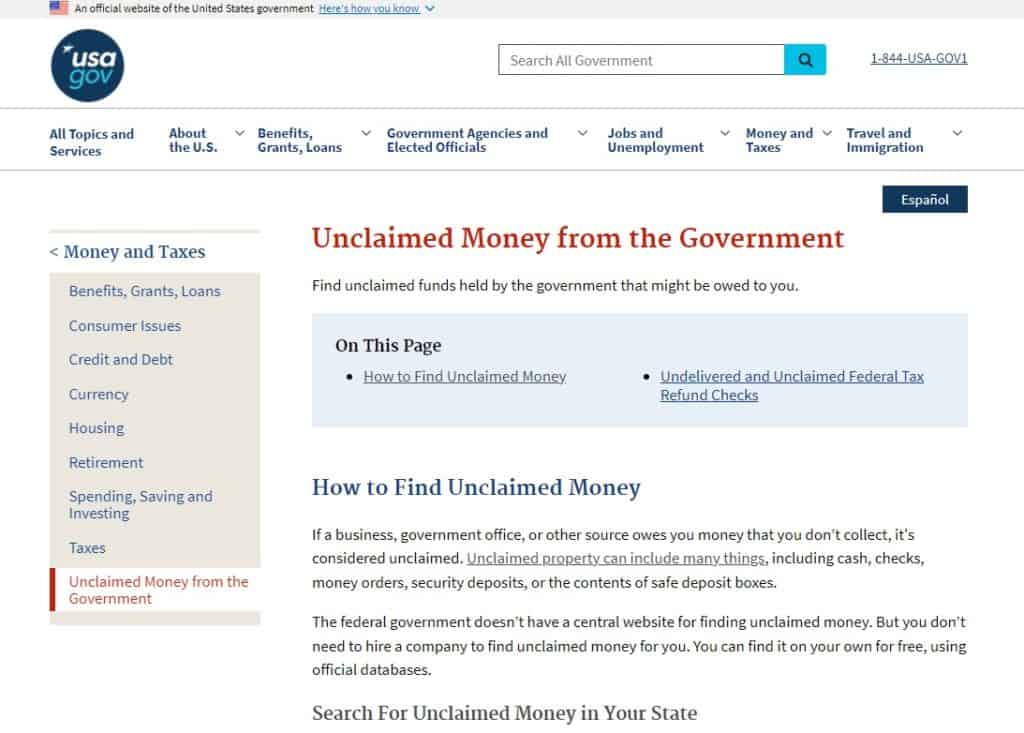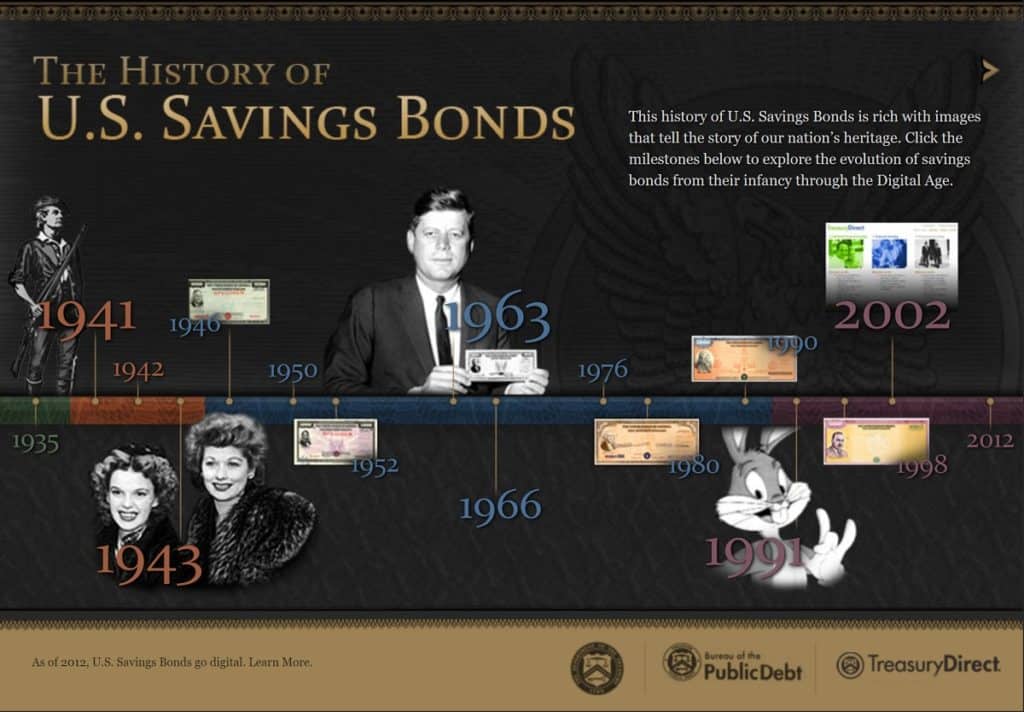Where to Search for Unclaimed Money and Property for Free
Who doesn’t love FREE money? Did you know that there could be unclaimed money or property being held for you to claim? Imagine if you found a few hundred or a few thousand dollars to put toward your next adventure.
Have you ever had a financial account from your youth or college days that slipped your mind or you lost track of? Maybe you forgot about a 401K in a job change. Could you have missed doing an address change during a life transition or home move and forgot to pick up a rental or utility deposit? It’s possible that you could also own U.S. Savings Bonds that have matured and are ready to be redeemed for cash.

Find Unclaimed Money or Property That You Forgot in the U.S.
In the USA there are laws that require businesses to turn over money from unclaimed or dormant accounts to their State Treasury Department if the owner can’t be found or doesn’t respond to notices. Each state is different, but essentially if a business can’t find you, your money is considered “unclaimed property” after a period of time (for many states it’s 5 years or more, but your state could be shorter or longer).
The amazing fact is that there are literally BILLIONS of dollars in unclaimed money/property in American accounts alone. Once the money is deemed “unclaimed” it’s sent to each State Treasury. In most cases, you can still claim that free money if you can provide proof that you’re the rightful owner or the heir of a deceased owner.
Companies may contact you to say they can help you find the money. You DON’T have to pay someone else who’s going to take a cut of it or charge a fee. You can find it yourself for free.
Have you moved or had life changes like a marriage or divorce? Is it possible that your parents or even grandparents had accounts they forgot along the way? With a little bit of searching, you may be surprised at what you discover.
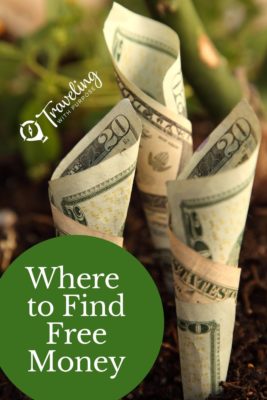
Find Unclaimed Money Outside of the USA too
Unclaimed Property regulations don’t exist everywhere in the world, but some countries like Canada, Australia, New Zealand, and others have started to regulate the handling of money and property where the owner can’t be found. You can check for the latest info to see if your country is listed here. If you don’t see your country listed, the best way to find out if there’s unclaimed money set aside is to do a quick web browser search for “unclaimed property” or “unclaimed money” for your country.
Examples of USA Unclaimed Money and Unclaimed Property
- Dormant Checking or Savings accounts
- Federal Deposit Insurance Corporation (FDIC) – failed bank funds
- Stocks
- Uncashed dividends
- Uncashed pay checks
- Unpaid wages [if your current or former employer broke labor laws]
- Federal and State Tax Refunds
- Unclaimed pensions
- Traveler’s checks
- Trust or Estate distributions
- Unredeemed money orders or gift certificates (in some states)
- Certificates of deposit (CDs)
- Customer overpayments
- Utility and rental security deposits
- Refunds for mortgage insurance obtained by government loan – Housing & Urban Dev
- Mineral royalty payments
- Contents of safe deposit boxes
- Swiss Bank accounts
- Veterans Administration (VA) Life Insurance funds
- Insurance payments or refunds and life insurance policies
- Annuities and Individual Retirement Accounts (IRAs)
Where Can You Search for Unclaimed Money or Property in the U.S. and Canada?
There are a few ways to start your search for unclaimed money or unclaimed property in the U.S.A. and in Canada too.
The Canadian government site is at the Financial Consumer Agency for the Government of Canada.
Visit the Unclaimed Money Page at the USA.gov Website
Start at the USA.gov website (screenshot above). This website has links where you can search for all these categories of unclaimed money:
- Money from Employers – Unpaid Wages – The Department of Labor (DOL)
- Pensions from Former Employers
- Money from VA Life Insurance – Search the U.S. Department of Veterans Affairs (VA)
- FHA-Insurance Refunds – If you had an FHA-insured mortgage, you may be eligible for a refund.
- Money from Tax Refunds – Tax Refunds – The Internal Revenue Service (IRS)
- Money from Banking and Investments
- Unclaimed Money from a Bankruptcy
- International Unclaimed Money
- Undelivered and Unclaimed Federal Tax Refund Checks
The USA.gov site will also link to the National Association of Unclaimed Property Administrators (screenshot below). NAUPA is a trusted authority in unclaimed property held at state treasuries. They help people like you find unclaimed money and property and help businesses comply with state unclaimed property laws.
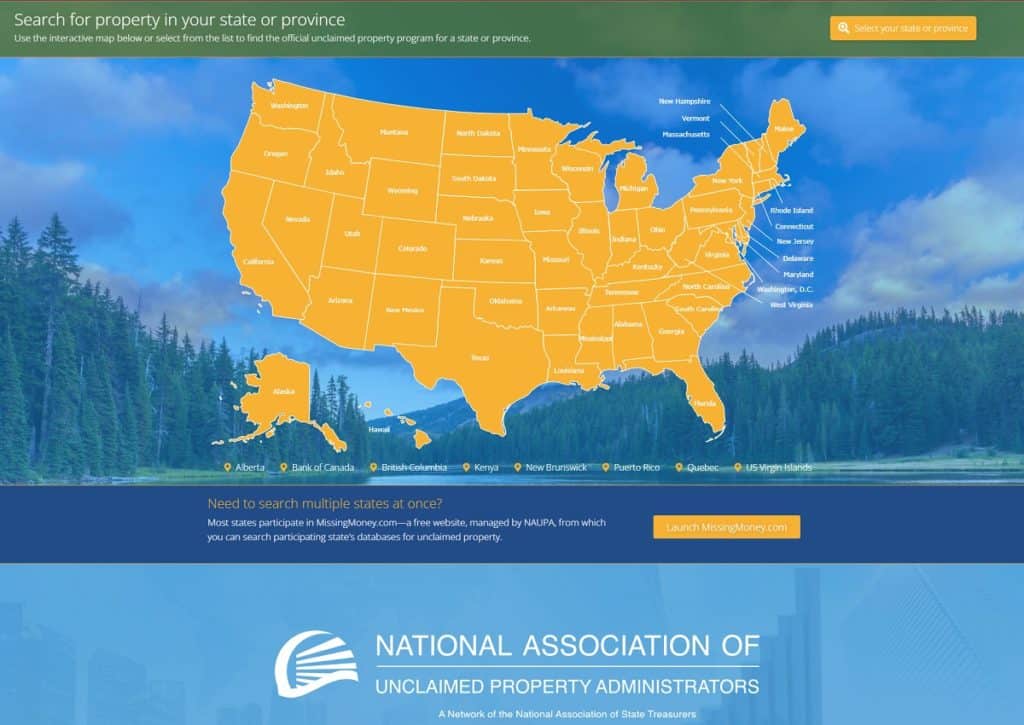
In addition to all 50 US States, the NAUPA map also has links to these Canadian sources, the country of Kenya, and two U.S. territories:
- Alberta
- Bank of Canada
- British Columbia
- Kenya
- New Brunswick
- Puerto Rico
- Quebec
- US Virgin Islands
Use the Multi-State Database at MissingMoney.com
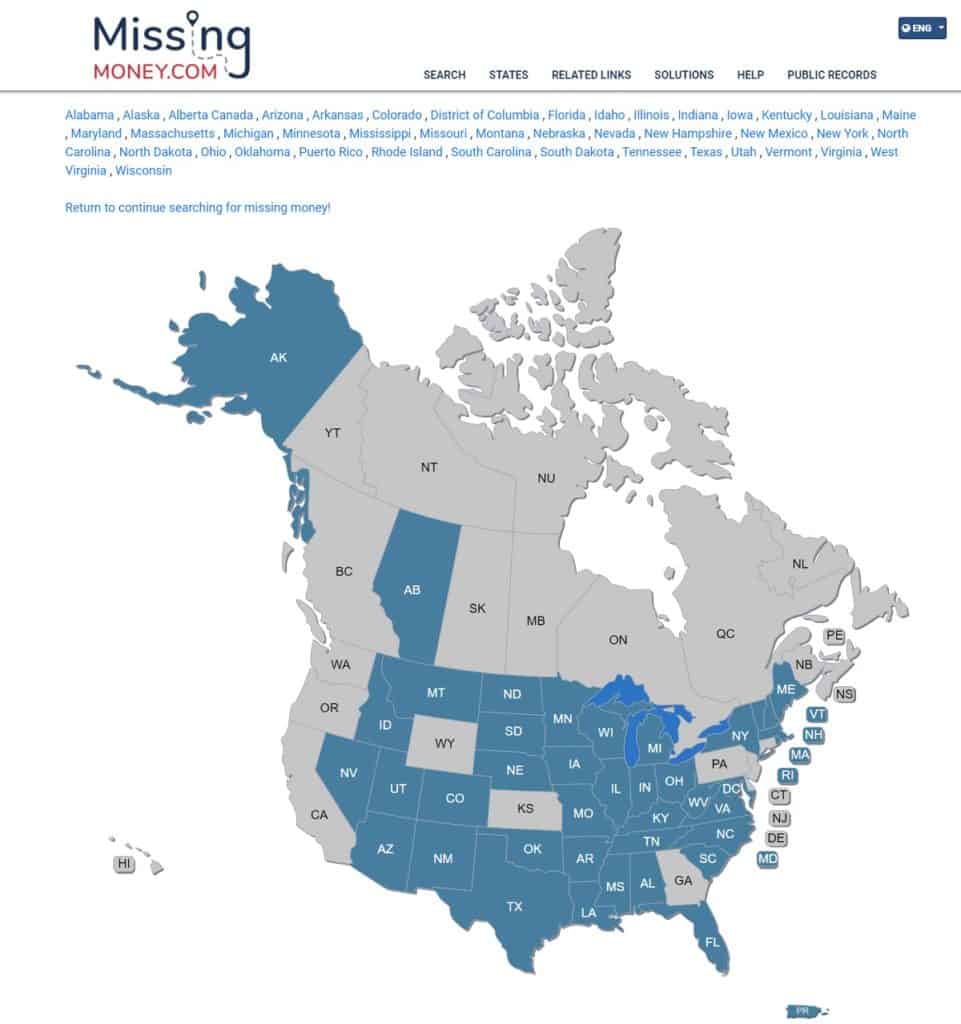
Option two is to search for unclaimed money using the multi-state database at MissingMoney.com (screenshot above). You can perform your search using your name but then search in different state records all from the same website. As you can see in the map above, this unclaimed money search site doesn’t cover every state, so depending on where you live you may have to go directly to your State Treasury website to search (see more about that below).
Depending on which state records you search for at the “Missing Money” site you may see a welcome message from the state like the one below.

Search at Your State Treasury Department Unclaimed Property Website
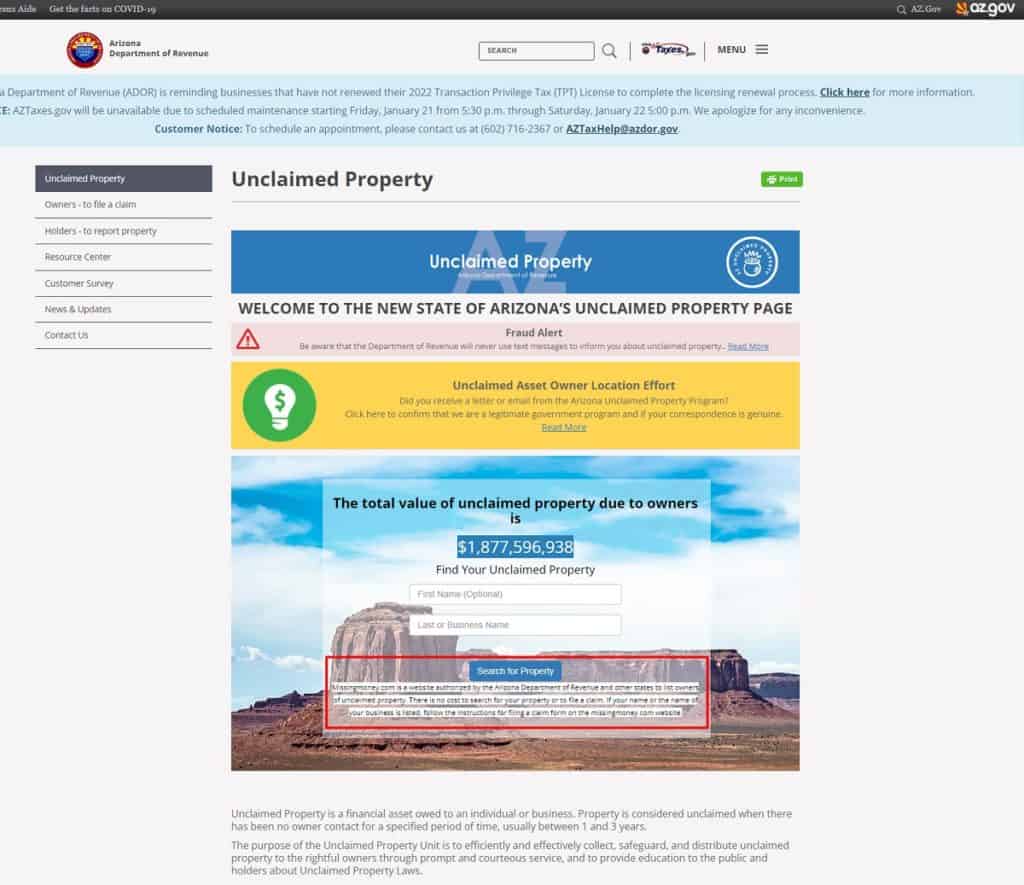
Option three is to go to your browser and type in the words “unclaimed property in [insert your state name]”. From there look for a site with the URL that ends with “.gov”. For example, the Arizona website is https://azdor.gov/unclaimed-property/. (See screenshot above) In the URL, “AZ” stands for the state of Arizona, “dor” is the Department of Revenue, and “.gov” tells you it’s an official government site. You may have to scroll down in the search results to get past the sites that are ads, but it shouldn’t be too far down the page.
How Do You Know You Can Trust Unclaimed Money Websites?
The federal government doesn’t have a central website for finding all of your unclaimed money. But you can find it on your own for free, using the official databases listed above. The U.S. Government website will tell you everything you need to know about searching for unclaimed property, federal funds, or money in the states where you’ve lived.
You may also notice that state websites that partner with MissingMoney.com will have a note like this one to confirm that the search site is legitimate.
“Missingmoney.com is a website authorized by the Arizona Department of Revenue and other states to list owners of unclaimed property. There is no cost to search for your property or to file a claim. If your name or the name of your business is listed, follow the instructions for filing a claim form on the missingmoney.com website.”
Arizona unclaimed property website
If you’re still hesitant to provide personal information or copies of your Identification card(s) to claim the money, you can try making a phone call. Call your state government treasury office or the federal office where the funds are held to confirm with a real person if the money you found in your unclaimed property search is legitimate.
Do a search for yourself, friends, and family members (alive or deceased) to see if there’s any money out there that’s unclaimed. These are the tips that I learned when I was doing my own searches.
Tips for Improving your Results in an Unclaimed Property Search
- Use just last name and a few letters of first name.
- Don’t use commas at the Missing Money website if the first and last names are entered all in one field.
- Search under the person’s maiden name or all the different names that may have been used. For example, my mom’s first name was Janice, but she also used Jan and Jaye at different times in her life. It’s best to try just “J” or “Ja” in the first name space.
- Do a separate search under each state where the person has lived.
- Results will usually show their last mailing address on record to help you figure out if it’s a possible match. It’s worthwhile to investigate results even if the address doesn’t look familiar since it may have been decades ago.
- Try common misspellings of first and last names too. I can’t tell you how many times my last name has been misspelled [Hahn instead of Hann] by a data entry person who wasn’t paying attention.
Make Sure You See All the Search Results
- The lists are not always alphabetized correctly, so it’s good to go through all the pages that come up to make sure one of your listings isn’t out of order.
- If more than 200 results come up (in Missing Money and possibly other sites) it cuts off the rest of the list, so if you see more than 10 pages of results at the bottom revise the search by adding another letter to the first name until you get less than 200 results. Otherwise, you’re not seeing everything.
- Along the same lines, in the various other sites, if your search brings a large number of pages of results make sure you’re at the end of the list. If you get to the last page of results and you aren’t at the end of the alphabet relating to your search it’s possible that you’re not seeing everything. Add another letter to the first name to narrow your search to less results.
States Have Different Rules for Unclaimed Money
- Each state and sometimes different businesses have their own rules about how you prove that you’re the owner and claim the money, so if you have multiple claims, you may see requests for different kinds of information. That’s normal.
- Obviously, if you find results for someone that’s still alive you’ll need to pass the info on to them. The exceptions would be if you’re a legal guardian or have some other legal power on behalf of that person. But what fun if you find money for someone you know and can pass on the good news that gives them more coin in their pockets.
- If you find money for a deceased family member, you’ll need to provide proof that you are the legal heir to any unclaimed money.
- While some states will hold unclaimed property indefinitely, others have expiration dates. For example, Arizona’s unclaimed property reverts to the state’s ownership if unclaimed for 35 years. This should be an incentive to check regularly and as soon as possible to make sure you don’t lose out.
I hope you find lots of money! We can all use a little extra cash these days.
How to Redeem Mature U.S. Savings Bonds
Depending on your age you may have never even heard of U.S. Savings Bonds, even though they’re still around. Paper Savings Bonds were first issued way back in 1935 under President Franklin Roosevelt as a way to pump more money into a government that was struggling after the Great Depression. It still serves as a way for average citizens to safely invest money with a moderate guaranteed return on investment. Decades ago Savings Bonds were bought by parents, relatives, and friends for their children as a kind of savings account for their future or sometimes even for wedding presents.
But, did you know that American citizens hold approximately $30 billion in matured, unredeemed savings bonds? Because they were paper, the bonds were sometimes lost or filed away and forgotten. Also, if you or someone in your family (a parent or grandparent) is a military veteran, you (or they) may have bought U.S. Savings Bonds through a payroll savings plan when in active duty. Visit the National Treasury website to find out more about the background on this and how to see if you have any savings bonds.
The Treasury Hunt online search engine can help you find out if you have matured, uncashed savings bonds that are over 30 years old and no longer earning interest. You can also find missing payments on other securities.
Your search could show:
- Matured savings bonds or Treasury notes that no longer earn interest
- Missing payments on series H or HH savings bonds, or
- Missing payments for securities held in Legacy Treasury Direct
Have Fun in Your Search
When I did a bunch of searches for friends and family this week I found money for half a dozen of my relatives in varying amounts. I found over $300 for each of my adult children and when I passed along the info my friend found over $700 for a family member.
Those kinds of results make me smile. Maybe you can use your found money for travel, a dinner out on the town, or maybe just for daily expenses.
In any case, be sure to share this post with all your friends so they can search too. With as transient as our population is these days, you never know what could be out there. I’d love to hear about whatever money you find so I can celebrate with you. I don’t need the specifics, but I love helping people and hearing about happy endings.


Category: Saving Money, Travel Tips

